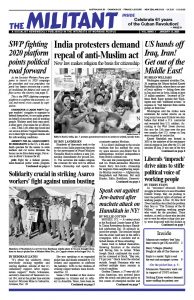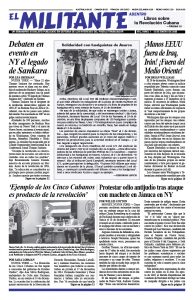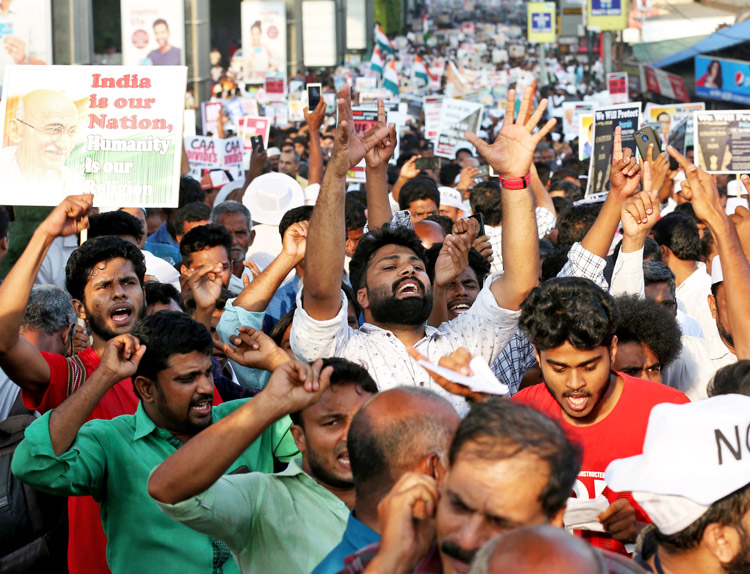Hundreds of thousands took to the streets across India protesting the push by the government of Prime Minister Narendra Modi to enforce a new Citizenship Amendment Act passed Dec. 11. The sectarian law makes religion the criterion for who will be offered Indian citizenship and openly discriminates against Muslims.
It is a direct challenge to the secular tradition that has marked the country since massive post-World War II mobilizations wrested independence from British colonial rule.
The new law promulgated by Modi and his Hindu-nationalist Bharatiya Janata Party fast-tracks citizenship for migrants from neighboring majority-Muslim countries — Afghanistan, Bangladesh and Pakistan. But only Hindus, Sikhs, Buddhists, Zoroastrians, Jains and Christians can qualify, not Muslims. And it excludes persecuted minorities, especially Muslims, from nearby non-Muslim majority countries like Sri Lanka, China and Myanmar.
Those ruling capitalist families that Modi represents seek to strengthen their ability to exploit India’s over 1.3 billion people and better position themselves to compete with Beijing and other rivals.
It goes along with a reactionary new National Registry of Citizens to be implemented across the country forcing everyone to produce documented proof of citizenship. A similar move in Assam province in August stripped citizenship from nearly 1.9 million people, most of them Muslims. Several hundred have been arrested and thrown into detention camps.
Protests over the new law began at two historically Muslim universities near the capital, New Delhi. Police attacked the students there Dec. 15, firing tear gas and beating them. Scores were injured and several maimed. This triggered broader protests from both Muslim and non-Muslim areas.
Tens of thousands more students erupted in protest at other campuses. Days later, many gathered in New Delhi holding signs like “No to CAA” and “No to citizenship based on religion.” Solidarity events also took place among Indian students abroad from Britain to the U.S.
“This act now puts India’s social fabric under threat,” Shrey Kapoor, a Harvard student from India, told the Financial Times. “Violence against defenseless students was the tipping point for me.”
Protesters at rallies began to fly India’s flag and quote its constitution as emblems of secular equality. Muslims have been joined by significant numbers of other faiths. Dalits, the community at the bottom of the still common Hindu hierarchical caste system, also joined.
At least 26 people, mostly Muslims, have been killed by cop attacks across the country, mainly in the most populous state of Uttar Pradesh, governed by the BJP. Thousands have been detained there.
The government used a British colonial-era law to impose sweeping restrictions — banning demonstrations, enforcing curfews, shutting down the internet and other attacks on political rights. They had done the same in August to weaken mass protests against the BJP rulers’ decision to strip special autonomous status for the Muslim-majority region of Jammu and Kashmir.
Britain’s divide-and-rule legacy
The religious animosities that Modi seeks to use to strengthen India’s capitalist rulers and assert Hindu supremacy are the legacy of British imperial domination starting in the 19th century.
For over a century London used a divide-and-rule strategy against Hindus and Muslims to maintain its colonial hold. But the Indian toilers’ struggle for national independence overcame these divisions. The uprising by sepoys (soldiers) in 1857 was “not a military mutiny but a national revolt,” Karl Marx, founder of the international communist movement, wrote that year. “Mussulmans [Muslims] and Hindus” fought together “against their common masters.”
Terrified by this united rebellion, British forces brutally crushed it. London took over direct colonial administration and stepped up efforts to pit Hindu and Muslim against each other.
In the face of a massive uprising for national independence after the second imperialist world war, the British rulers sought to hang on to as much of their power as possible by splitting the united independence struggle through the partition of India. The lives of millions were uprooted by creating the Muslim state of Pakistan.
Today the mass nationalist protest movement, fighting anew for a secular India, has put Modi on the defensive. The chief ministers of nine states have refused to implement the new citizenship law or the registry.
“We are here to fight for our rights,” Tarannum Begum, part of a women-led sit-in in a Muslim enclave in New Delhi, told Al Jazeera. “Until they take back their [policies], this will go on.” She added, “It is better to die here [protesting] than be put in camps.”


